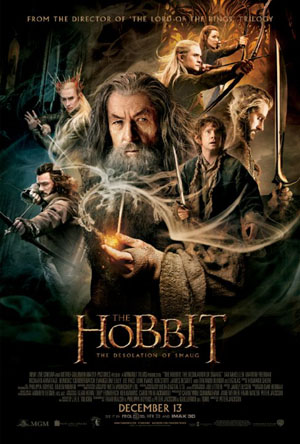 Inevitably, I found myself catching the first local showing of Peter Jackson’s latest entry into his J. R. R. Tolkien sweepstakes, The Hobbit: The Desolation of Smaug. It was better than I expected.
Inevitably, I found myself catching the first local showing of Peter Jackson’s latest entry into his J. R. R. Tolkien sweepstakes, The Hobbit: The Desolation of Smaug. It was better than I expected.
Thorin Oakinshield (Richard Armitage) is being watched – and not in a friendly way. He has been pursuing rumors of his father, Thrain, once King Under the Mountain, now said to be wandering the wilds. Thorin stops in an inn to grab a bite, where he is joined by Galdalf the Grey (Ian McKellan). It is not a chance meeting. Gandalf tells Thorin that he must reclaim his homeland of Erebor and unite the dwarves, because war is coming.
Fast forward a year, to the end of The Hobbit: An Unexpected Journey. (You can do that in movies.) Our band of doughty dwarves, plus one hobbit and one wizard, are being pursued by orcs – and a very large bear, who, it turns out, is none other than Beorn (Mikael Persbrandt), a “skin-changer,” in whose house the band finds itself taking refuge. Their path lies through the Mirkwood, and Beorn provides horses so they can outrun the orcs.
Mirkwood presents its own problems, not least of which is being captured by a band of elves who, under the leadership of Legolas (Orlando Bloom) and Tauriel (Evangeline Lilly), have come to wipe out a nest of large spiders, invaders from the south. The dwarves escape, of course, and make their way to Lake Town –- pursued by orcs and elves — which is only a short way from their goal: the Lonely Mountain.
The story is, when all is said and done, rather spare and fairly straightforward. It’s the window-dressing that turns The Desolation of Smaug into a nearly three hour film. There’s a lot of window-dressing.
Purists have already been screaming about the introduction of Legolas and Tauriel as major characters. Frankly, I have no problem with that – this is an adaptation, not a translation, and both characters do add a dimension to the story, especially Tauriel, with what looks to be a potential romantic involvement with one of the dwarves, Kili (Aidan Turner). Pacing, which seems to be one of director Peter Jackson’s weaknesses, is not so blatantly awkward as in his previous Tolkien efforts, although there were places where I found myself tapping my fingers. Perhaps the most glaring example is the long segment at the end in which first Bilbo (Martin Freeman) and then the whole band confront Smaug (Benedict Cumberbatch, who just oozes malice). It goes on and on and on. There are, thankfully, fewer sequences of trudging (or galloping) across barren landscapes, seemingly without end, but this is not by any means what you would call a tight film. I’m not going to discuss the end of the film, except to note that the audience was audibly outraged.
There’s not much to say about the cast – this is a group of superb actors who can’t be faulted on any score – even Lee Pace, as Thranduil, though pompous and arrogant, is appropriately so. I do want to note, however, Freeman’s ongoing development of Bilbo – it’s a matter of small mannerisms, almost invisible gestures, tiny little flourishes that bring Bilbo vividly to life.
Effects are, as is only to be expected, excellent – Smaug is a treasure, sinuous and menacing, even without Cumberbatch’s contribution. Cinematography is strongly oriented toward the lush – only to be expected, given the fantasy landscapes of the location – and pleasing, if not particularly striking.
And when all is said and done, I’m left with something of a conundrum: I’ve seen the movie twice, and it just didn’t make that much of an impression on me. It was a nice two and a half hours on a dreary winter afternoon, and that’s about it. There’s very little magic here, aside from what’s built into the script, and with this story, that’s a sad lack.
(Metro-Goldwyn Mayer/New Line Cinema/WingNut Films, 2013) Rated PG-13, running time 161 minutes. Full credits at IMDb.
